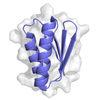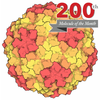[English] 日本語
 Yorodumi
Yorodumi- PDB-6n5d: Broadly protective antibodies directed to a subdominant influenza... -
+ Open data
Open data
- Basic information
Basic information
| Entry | Database: PDB / ID: 6n5d | ||||||
|---|---|---|---|---|---|---|---|
| Title | Broadly protective antibodies directed to a subdominant influenza hemagglutinin epitope | ||||||
 Components Components |
| ||||||
 Keywords Keywords |  VIRAL PROTEIN/IMMUNE SYSTEM / VIRAL PROTEIN/IMMUNE SYSTEM /  influenza / influenza /  antibody / antibody /  complex / complex /  hemagglutinin / immunogen design / hemagglutinin / immunogen design /  glycan / glycan /  VIRAL PROTEIN-IMMUNE SYSTEM complex VIRAL PROTEIN-IMMUNE SYSTEM complex | ||||||
| Function / homology |  Function and homology information Function and homology information viral budding from plasma membrane / clathrin-dependent endocytosis of virus by host cell / host cell surface receptor binding / fusion of virus membrane with host plasma membrane / fusion of virus membrane with host endosome membrane / viral budding from plasma membrane / clathrin-dependent endocytosis of virus by host cell / host cell surface receptor binding / fusion of virus membrane with host plasma membrane / fusion of virus membrane with host endosome membrane /  viral envelope / virion attachment to host cell / host cell plasma membrane / virion membrane / viral envelope / virion attachment to host cell / host cell plasma membrane / virion membrane /  membrane membraneSimilarity search - Function | ||||||
| Biological species |    Influenza A virus Influenza A virus  Mus musculus (house mouse) Mus musculus (house mouse) | ||||||
| Method |  X-RAY DIFFRACTION / X-RAY DIFFRACTION /  SYNCHROTRON / SYNCHROTRON /  MOLECULAR REPLACEMENT / Resolution: 3 Å MOLECULAR REPLACEMENT / Resolution: 3 Å | ||||||
 Authors Authors | Bajic, G. / Schmidt, A.G. | ||||||
| Funding support |  United States, 1items United States, 1items
| ||||||
 Citation Citation |  Journal: Cell Host Microbe / Year: 2019 Journal: Cell Host Microbe / Year: 2019Title: Influenza Antigen Engineering Focuses Immune Responses to a Subdominant but Broadly Protective Viral Epitope. Authors: Bajic, G. / Maron, M.J. / Adachi, Y. / Onodera, T. / McCarthy, K.R. / McGee, C.E. / Sempowski, G.D. / Takahashi, Y. / Kelsoe, G. / Kuraoka, M. / Schmidt, A.G. | ||||||
| History |
|
- Structure visualization
Structure visualization
| Structure viewer | Molecule:  Molmil Molmil Jmol/JSmol Jmol/JSmol |
|---|
- Downloads & links
Downloads & links
- Download
Download
| PDBx/mmCIF format |  6n5d.cif.gz 6n5d.cif.gz | 404.3 KB | Display |  PDBx/mmCIF format PDBx/mmCIF format |
|---|---|---|---|---|
| PDB format |  pdb6n5d.ent.gz pdb6n5d.ent.gz | 329.8 KB | Display |  PDB format PDB format |
| PDBx/mmJSON format |  6n5d.json.gz 6n5d.json.gz | Tree view |  PDBx/mmJSON format PDBx/mmJSON format | |
| Others |  Other downloads Other downloads |
-Validation report
| Arichive directory |  https://data.pdbj.org/pub/pdb/validation_reports/n5/6n5d https://data.pdbj.org/pub/pdb/validation_reports/n5/6n5d ftp://data.pdbj.org/pub/pdb/validation_reports/n5/6n5d ftp://data.pdbj.org/pub/pdb/validation_reports/n5/6n5d | HTTPS FTP |
|---|
-Related structure data
| Related structure data | 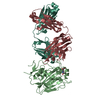 6n5bSC 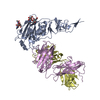 6n5eC 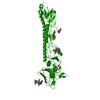 1ha0S  4hkxS S: Starting model for refinement C: citing same article ( |
|---|---|
| Similar structure data |
- Links
Links
- Assembly
Assembly
| Deposited unit | 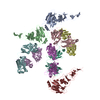
| ||||||||
|---|---|---|---|---|---|---|---|---|---|
| 1 | 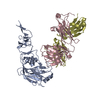
| ||||||||
| 2 | 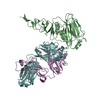
| ||||||||
| 3 | 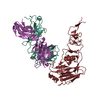
| ||||||||
| Unit cell |
|
- Components
Components
| #1: Protein |  Mass: 31150.033 Da / Num. of mol.: 3 Source method: isolated from a genetically manipulated source Source: (gene. exp.)    Influenza A virus / Gene: HA / Production host: Influenza A virus / Gene: HA / Production host:   Trichoplusia ni (cabbage looper) / References: UniProt: P03437 Trichoplusia ni (cabbage looper) / References: UniProt: P03437#2: Antibody |  Immunoglobulin heavy chain Immunoglobulin heavy chainMass: 25338.352 Da / Num. of mol.: 3 Source method: isolated from a genetically manipulated source Source: (gene. exp.)   Mus musculus (house mouse) / Gene: HC / Production host: Mus musculus (house mouse) / Gene: HC / Production host:   Homo sapiens (human) Homo sapiens (human)#3: Antibody |  Immunoglobulin light chain Immunoglobulin light chainMass: 22919.457 Da / Num. of mol.: 3 Source method: isolated from a genetically manipulated source Source: (gene. exp.)   Mus musculus (house mouse) / Production host: Mus musculus (house mouse) / Production host:   Homo sapiens (human) Homo sapiens (human) |
|---|
-Experimental details
-Experiment
| Experiment | Method:  X-RAY DIFFRACTION / Number of used crystals: 1 X-RAY DIFFRACTION / Number of used crystals: 1 |
|---|
- Sample preparation
Sample preparation
| Crystal | Density Matthews: 2.74 Å3/Da / Density % sol: 55.13 % |
|---|---|
Crystal grow | Temperature: 291 K / Method: vapor diffusion, hanging drop / pH: 6.5 Details: 0.2 M sodium bromide, 0.1 M Bis-Tris propane, pH 6.5, 20% w/v PEG3350 |
-Data collection
| Diffraction | Mean temperature: 100 K / Serial crystal experiment: N | ||||||||||||||||||||||||||||||||||||||||||||||||||||||||||||||||||||||||||||||||||||||||
|---|---|---|---|---|---|---|---|---|---|---|---|---|---|---|---|---|---|---|---|---|---|---|---|---|---|---|---|---|---|---|---|---|---|---|---|---|---|---|---|---|---|---|---|---|---|---|---|---|---|---|---|---|---|---|---|---|---|---|---|---|---|---|---|---|---|---|---|---|---|---|---|---|---|---|---|---|---|---|---|---|---|---|---|---|---|---|---|---|---|
| Diffraction source | Source:  SYNCHROTRON / Site: SYNCHROTRON / Site:  ALS ALS  / Beamline: 8.2.2 / Wavelength: 0.9787 Å / Beamline: 8.2.2 / Wavelength: 0.9787 Å | ||||||||||||||||||||||||||||||||||||||||||||||||||||||||||||||||||||||||||||||||||||||||
| Detector | Type: ADSC QUANTUM 315r / Detector: CCD / Date: May 23, 2018 | ||||||||||||||||||||||||||||||||||||||||||||||||||||||||||||||||||||||||||||||||||||||||
| Radiation | Monochromator: double crystal Si(111) / Protocol: SINGLE WAVELENGTH / Monochromatic (M) / Laue (L): M / Scattering type: x-ray | ||||||||||||||||||||||||||||||||||||||||||||||||||||||||||||||||||||||||||||||||||||||||
| Radiation wavelength | Wavelength : 0.9787 Å / Relative weight: 1 : 0.9787 Å / Relative weight: 1 | ||||||||||||||||||||||||||||||||||||||||||||||||||||||||||||||||||||||||||||||||||||||||
| Reflection twin | Operator: -k,-h,-l / Fraction: 0.46 | ||||||||||||||||||||||||||||||||||||||||||||||||||||||||||||||||||||||||||||||||||||||||
| Reflection | Resolution: 3→44.369 Å / Num. obs: 49440 / % possible obs: 100 % / Redundancy: 6.437 % / Biso Wilson estimate: 51.897 Å2 / CC1/2: 0.985 / Rmerge(I) obs: 0.255 / Rrim(I) all: 0.277 / Χ2: 0.914 / Net I/σ(I): 9.22 / Num. measured all: 318259 / Scaling rejects: 5 | ||||||||||||||||||||||||||||||||||||||||||||||||||||||||||||||||||||||||||||||||||||||||
| Reflection shell | Diffraction-ID: 1
|
- Processing
Processing
| Software |
| ||||||||||||||||||||||||||||||||||||||||||||||||||||||||||||||||||||||||||||||||||||||||||||||||||||||||||||||||||||||||||||||
|---|---|---|---|---|---|---|---|---|---|---|---|---|---|---|---|---|---|---|---|---|---|---|---|---|---|---|---|---|---|---|---|---|---|---|---|---|---|---|---|---|---|---|---|---|---|---|---|---|---|---|---|---|---|---|---|---|---|---|---|---|---|---|---|---|---|---|---|---|---|---|---|---|---|---|---|---|---|---|---|---|---|---|---|---|---|---|---|---|---|---|---|---|---|---|---|---|---|---|---|---|---|---|---|---|---|---|---|---|---|---|---|---|---|---|---|---|---|---|---|---|---|---|---|---|---|---|---|
| Refinement | Method to determine structure : :  MOLECULAR REPLACEMENT MOLECULAR REPLACEMENTStarting model: PDB entries 1HA0, 6N5B, & 4HKX Resolution: 3→44.369 Å / Cross valid method: THROUGHOUT / σ(F): 1.96 / Phase error: 23.82
| ||||||||||||||||||||||||||||||||||||||||||||||||||||||||||||||||||||||||||||||||||||||||||||||||||||||||||||||||||||||||||||||
| Solvent computation | Shrinkage radii: 0.9 Å / VDW probe radii: 1.11 Å | ||||||||||||||||||||||||||||||||||||||||||||||||||||||||||||||||||||||||||||||||||||||||||||||||||||||||||||||||||||||||||||||
| Displacement parameters | Biso max: 127.15 Å2 / Biso mean: 55.5971 Å2 / Biso min: 26.59 Å2 | ||||||||||||||||||||||||||||||||||||||||||||||||||||||||||||||||||||||||||||||||||||||||||||||||||||||||||||||||||||||||||||||
| Refinement step | Cycle: final / Resolution: 3→44.369 Å
| ||||||||||||||||||||||||||||||||||||||||||||||||||||||||||||||||||||||||||||||||||||||||||||||||||||||||||||||||||||||||||||||
| LS refinement shell | Refine-ID: X-RAY DIFFRACTION / Rfactor Rfree error: 0 / Total num. of bins used: 17
|
 Movie
Movie Controller
Controller


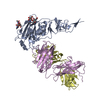
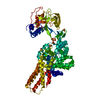
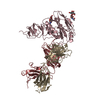
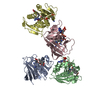
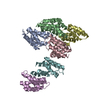
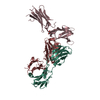

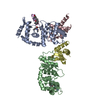
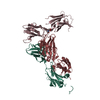
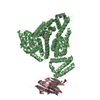
 PDBj
PDBj




